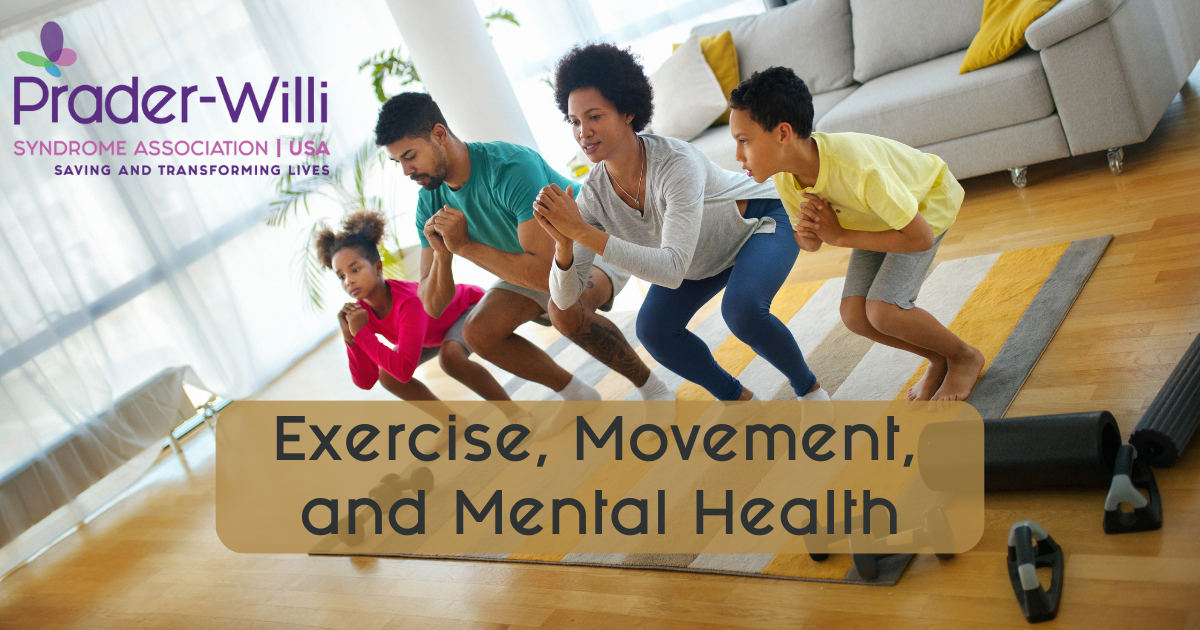In the PWS community, we emphasize the importance of exercise and movement as management strategies and life-saving habits for people living with PWS. With the complications of hyperphagia and a slower metabolism, exercise is critical for care. But our loved ones are not alone in this. Physical fitness is incredibly valuable and needed for parents and caregivers as well.
Evidence
Chronic stress, something very familiar to parents and caregivers, can have long-lasting negative effects on the mind and body. High blood pressure, weakened immune system, anxiety, and depression are all potential symptoms of long-lasting stress. Thankfully, simple practices like exercise and movement are great tools we can implement at home to help deal with the harmful effects of chronic stress.
Most people know about the benefits of exercise and movement on their physical health, but popular medical spaces are starting to speak about how exercise and movement are critical for our mental health as well. According to the Mayo Clinic, regular exercise releases feel-good endorphins and helps take our minds off of our worries. It can also benefit our mental well-being by helping us gain confidence, find healthy coping skills, and create more opportunities for social interaction. Social interaction is an important focus for parents and caregivers who may be suffering from depression, thus isolating themselves, or who find themselves easily cut off from socializing due to the demands of their loved one’s disorder.
The American Psychology Association recognizes that exercise can decrease the effects of stress on the body, improve a person’s mental health and mood, and even enhance the brain’s ability for memory and cognition. The right kind of stress, like exercise, may help make the body more resilient by allowing it to practice coping with stress and building stronger and necessary communication pathways between the body’s physiological systems.
Research has shown that exercise over 12 weeks increases the area of the hippocampus in the brain. The hippocampus is responsible for short-term and long-term memory and is also involved in learning and emotion. But even one exercise session of 30 minutes has a positive effect on the brain. It reduces the impact of stress and increases the production of essential neurotransmitters involved in cell regeneration.
What does this look like?
The US Dept. of Health and Human Services recommends 150 minutes of moderate aerobic activity a week. This may sound like a lot, especially if you are prone to a more sedentary lifestyle. Thankfully, this time can be broken down into easily digestible chunks. Consider it as 30 minutes a day for 5 days a week. Those 30 minutes could be a 15-minute walk in the morning and another 15-minute walk in the evening. Perhaps it’s a strenuous hike at lunchtime, a bike ride to work, an evening dance class or family dance party in your living room, or a basketball game with friends. Yoga is an excellent activity for decreasing your body’s production of cortisol, a stress hormone.
Exercise vs Physical Activity
Especially for people who have had negative experiences with exercise, avoid getting bogged down in the expectation that exercise is the only way to receive these benefits. Here is an important distinction as defined in the article “How is exercise different from physical activity? A concept analysis” (National Library of Medicine)
“Exercise is a subcategory of physical activity that is planned, structured, repetitive, and purposefully focused on improvement or maintenance of one or more components of physical fitness. Physical activity is any bodily movement produced by skeletal muscles that require energy expenditure.”
To be clear, it is not exercise alone that brings mental health benefits, but physical activity. There are many ways to move your body. Gardening, cleaning the house, or mowing the lawn are also ways to get your body moving. Those activities have the added benefit of creating an organized, more relaxing space: homegrown food or pretty flowers, a de-cluttered space to hang out in, or a manicured lawn and the fresh smell of grass.
Just as it’s essential to get your body moving regularly, it is important to do so with activities you enjoy. If you decide that you are going to create a daily routine at the gym, but you hate going and have to convince and cajole yourself to go, that probably is not sustainable. Find a friend to walk with in the park or a fun workout video on YouTube. When it comes to exciting and unique fitness videos, the internet is your friend.
Motivation
As parents and caregivers, we are no strangers to stress, anxiety, and even bouts of depression. There is growing evidence that these are harmful to our bodies. We also know that moving our bodies has an incredible impact on our mental health and reduces the effects of stress, anxiety, and depression. Move a muscle, change a thought is a popular slogan in recovery circles, and it can apply to our community as well.
So find something you like to do, a partner you like to do it with and set some goals if that helps. Remember that you are human, and let your goal be progress, not perfection. If you miss a day of movement, don’t throw in the towel. Return to it the next day or when you feel up for it. If needed, take small steps to start and celebrate those as a movement toward a larger goal. Recognize that getting more physical movement into your life is not a chore but a tool to help you feel better.
In January, we are focusing on the mental well-being of parents and caregivers because your health and wellness are as critical and valuable as your loved ones. So lace up those walking shoes, turn on that 90s hip-hop fitness video, or roll out that yoga mat and give your body a chance to shake off that stress and claim more resiliency. And when you encourage your loved one with PWS to get moving and do their exercises, remember to join them.
Sources and Where to Learn More
Depression and anxiety: Exercise eases symptoms – Mayo Clinic Dec. 23, 2023
Working out boosts brain health (apa.org) American Psychological Association. March 4, 2020
How Exercise Impacts on the Brain and Our Mental Health. Wellness with Ella podcast, Oct. 2, 2018
How is exercise different from physical activity? A concept analysis – PubMed (nih.gov) Oct. 12, 2018
Share this!





 Jennifer Bolander has been serving as a Special Education Specialist for PWSA (USA) since October of 2015. She is a graduate of John Carroll University and lives in Ohio with her husband Brad and daughters Kate (17), and Sophia (13) who was born with PWS.
Jennifer Bolander has been serving as a Special Education Specialist for PWSA (USA) since October of 2015. She is a graduate of John Carroll University and lives in Ohio with her husband Brad and daughters Kate (17), and Sophia (13) who was born with PWS. Perry A. Zirkel has written more than 1,500 publications on various aspects of school law, with an emphasis on legal issues in special education. He writes a regular column for NAESP’s Principal magazine and NASP’s Communiqué newsletter, and he did so previously for Phi Delta Kappan and Teaching Exceptional Children.
Perry A. Zirkel has written more than 1,500 publications on various aspects of school law, with an emphasis on legal issues in special education. He writes a regular column for NAESP’s Principal magazine and NASP’s Communiqué newsletter, and he did so previously for Phi Delta Kappan and Teaching Exceptional Children. Evan has worked with the Prader-Willi Syndrome Association (USA) since 2007 primarily as a Crisis Intervention and Family Support Counselor. Evans works with parents and schools to foster strong collaborative relationships and appropriate educational environments for students with PWS.
Evan has worked with the Prader-Willi Syndrome Association (USA) since 2007 primarily as a Crisis Intervention and Family Support Counselor. Evans works with parents and schools to foster strong collaborative relationships and appropriate educational environments for students with PWS. Dr. Amy McTighe is the PWS Program Manager and Inpatient Teacher at the Center for Prader-Willi Syndrome at the Children’s Institute of Pittsburgh. She graduated from Duquesne University receiving her Bachelor’s and Master’s degree in Education with a focus on elementary education, special education, and language arts.
Dr. Amy McTighe is the PWS Program Manager and Inpatient Teacher at the Center for Prader-Willi Syndrome at the Children’s Institute of Pittsburgh. She graduated from Duquesne University receiving her Bachelor’s and Master’s degree in Education with a focus on elementary education, special education, and language arts. Staci Zimmerman works for Prader-Willi Syndrome Association of Colorado as an Individualized Education Program (IEP) consultant. Staci collaborates with the PWS multi-disciplinary clinic at the Children’s Hospital in Denver supporting families and school districts around the United States with their child’s Individual Educational Plan.
Staci Zimmerman works for Prader-Willi Syndrome Association of Colorado as an Individualized Education Program (IEP) consultant. Staci collaborates with the PWS multi-disciplinary clinic at the Children’s Hospital in Denver supporting families and school districts around the United States with their child’s Individual Educational Plan. Founded in 2001, SDLC is a non-profit legal services organization dedicated to protecting and advancing the legal rights of people with disabilities throughout the South. It partners with the Southern Poverty Law Center, Protection and Advocacy (P&A) programs, Legal Services Corporations (LSC) and disability organizations on major, systemic disability rights issues involving the Individuals with Disabilities Education Act (IDEA), Americans with Disabilities Act (ADA), and the federal Medicaid Act. Recently in November 2014, Jim retired.
Founded in 2001, SDLC is a non-profit legal services organization dedicated to protecting and advancing the legal rights of people with disabilities throughout the South. It partners with the Southern Poverty Law Center, Protection and Advocacy (P&A) programs, Legal Services Corporations (LSC) and disability organizations on major, systemic disability rights issues involving the Individuals with Disabilities Education Act (IDEA), Americans with Disabilities Act (ADA), and the federal Medicaid Act. Recently in November 2014, Jim retired.